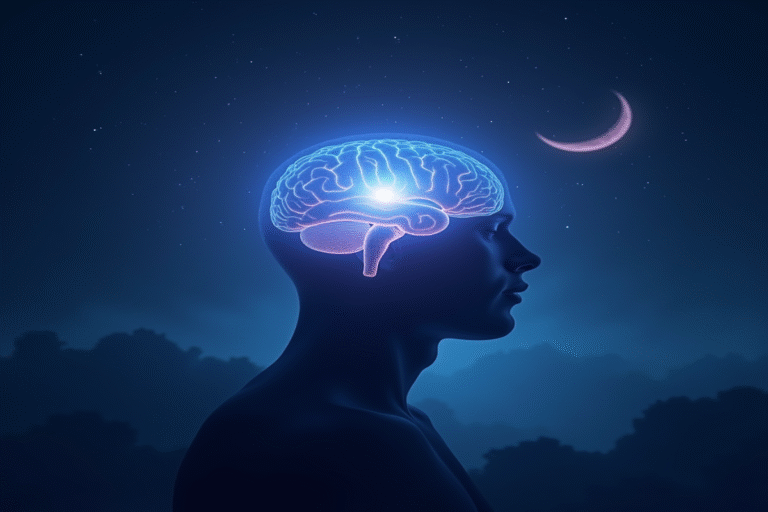Ever wondered why you feel sleepy as darkness falls and alert when daylight returns? The answer lies in a fascinating hormone called melatonin – your body’s natural sleep regulator that orchestrates the daily rhythm between wakefulness and slumber.
The Conductor of Your Sleep Orchestra
Deep within your brain, a small gland called the pineal gland produces melatonin – a hormone that signals to your body, “It’s time to sleep.” This tiny gland translates the outside world’s light conditions into chemical signals that set your internal clock.
Melatonin is derived from the neurotransmitter serotonin, which is made from the amino acid tryptophan – the same compound found in turkey that’s often linked to drowsiness after big meals. These connections highlight the close relationship between your diet, mood, and sleep chemistry.
Your Internal Clock’s Timekeeper
Your body keeps time using an internal clock called the circadian rhythm, which follows a cycle of about 24 hours. Melatonin is the main chemical messenger that synchronizes this cycle. When darkness falls, melatonin production increases, usually beginning around 9 PM and peaking between 2 and 4 AM, before dropping off as morning nears.
This system is finely tuned to light. Special photoreceptors in your eyes – called intrinsically photosensitive retinal ganglion cells (ipRGCs) – detect light and send signals to your brain’s suprachiasmatic nucleus (SCN), the master clock. The SCN then tells the pineal gland how much melatonin to release.
The Sleep Cascade: What Happens When Melatonin Rises
When melatonin levels rise in your bloodstream, several changes follow that prepare you for sleep:
- Body temperature drops – Melatonin helps lower your core temperature by about 0.5 to 1°F (0.3 to 0.6°C), making sleep easier
- Blood pressure decreases – Your body relaxes as part of preparing for sleep
- Alertness diminishes – Thinking and awareness slow down as your brain gets ready to rest
- Digestive processes slow – The body shifts energy toward restoration rather than digestion
This is why your eyelids feel heavy and you grow sleepy in the evening – it’s the effect of rising melatonin.
The Light-Dark Connection: Why Blue Light Is a Sleep Thief
In modern life, this system faces new challenges: the ipRGCs in your eyes are especially sensitive to blue light (wavelengths between 450-485 nm) found not just in sunlight but also in screens like phones and TVs. Using these devices before bed sends a “daytime” signal to your brain, suppressing melatonin production.
Research shows that just 30 minutes of exposure to bright screens can cut melatonin production by about 50%, explaining why screen time in the evening can make falling asleep harder.
Melatonin Throughout Life: From Abundance to Scarcity
Your body’s production of melatonin changes with age. Newborns don’t make much melatonin for the first three months, which contributes to their unpredictable sleep. Children produce plenty of melatonin, which helps them sleep soundly. During puberty, melatonin release shifts later at night, making teens naturally want to stay up and wake up later – even though school often starts early.
As we get older, melatonin production drops. By age 60, many people make less than half as much as they did in youth, which often leads to more difficulty sleeping.
When Time Zones Cross: Melatonin and Jet Lag
Melatonin explains why jet lag feels so disruptive. Traveling quickly across time zones puts your internal clock, and your melatonin cycle, out of sync with your new location’s light-dark schedule. Until your melatonin rhythm resets, your body and brain remain mismatched, causing tiredness and disorientation.
Protecting Your Natural Sleep Rhythm
Knowing how melatonin works shows why good sleep habits matter:
- Sticking to regular sleep and wake times keeps your melatonin cycle stable
- Getting morning sunlight helps reset your body clock
- Reducing evening blue light (by using screen filters, blue-blocking glasses, or avoiding devices) helps maintain natural melatonin levels
- Making your bedroom dark at night allows melatonin to do its job best
While melatonin supplements are common, they are most helpful when used for jet lag or certain sleep disorders, rather than as a daily solution for insomnia.
Nature’s Perfect Sleep Solution
The design of the melatonin system is remarkable. This simple hormone evolved over millions of years to coordinate our internal cycles with the day-night rhythm of the world. Even in our modern routines, we remain strongly tied to these natural rhythms.
The next time you feel that wave of sleepiness in the evening, remember the complex series of signals in your brain, all led by melatonin – the conductor of your sleep symphony.





